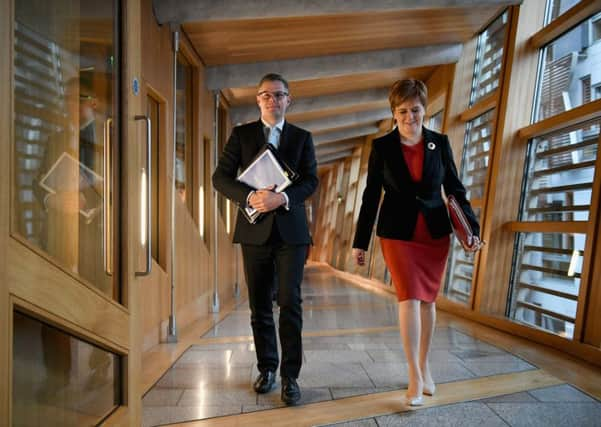Scotland bottom for economic growth, warn Tories


With MSPs set to debate stage one of the budget this week, the Scottish Tories have produced economic analysis which they will use to argue against Sturgeon’s plans for income tax hikes.
A dossier produced by the Conservatives compared Scottish growth rates with other countries across the G20, OECD and EU.
Advertisement
Hide AdAdvertisement
Hide AdThey used GDP figures produced by the Scottish Government’s independent economic forecaster, the Scottish Fiscal Commission (SFC), the Office for Budget Responsibility and the OECD.
A comparison across 46 countries showed that Scotland was 41st in 2016 with GDP growth of 0.4 per cent.
Although Scottish GDP is forecast at 0.7 per cent in 2018 and 0.9 per cent in 2019. Scotland is leapfrogged by other countries and ends up languishing in 46th position at the foot of the table.
With the Scottish economy lagging behind other countries, the Conservatives will argue that Finance Secretary Derek Mackay should not be raising taxes.
The forthcoming budget will be the first to use Holyrood’s new powers to raise income tax. Mackay proposes to introduce an extra 21 per cent income tax band for earnings between £24,000 and £44,000 that will sit between the basic and higher rates. He has also put a penny on both the higher and top rates, increasing them to 41p and 46p respectively.
Tory analysis also claims the Scottish Government has failed to meet two key economic targets introduced in the Scottish Government’s 2007 Economic Strategy.
The first was “to raise the GDP growth rate to the UK level by 2011”. This has now been reset to an indefinite target as Scotland has failed to match UK growth in 30 of the 42 quarters since they came to power. The second target was “to match the GDP growth rate of the small independent EU countries by 2017.” As of Q3 2017, Scottish growth was 3 per cent lower than in small EU countries, and the gap is increasing.
The Tory dossier also claims Scottish firms pay business rates equivalent to 2 per cent of GDP, the highest in Europe.
Advertisement
Hide AdAdvertisement
Hide AdYesterday shadow economy secretary Dean Lockhart said: “The simple fact is that despite ten years in power, the SNP has created a Scotland with high taxes and continuous low growth.
“To quote the independent Fraser of Allander Institute, such low trends in economic growth for Scotland have not been witnessed in 60 years. This impacts on the amount of money available for schools, hospitals and roads.
“The SNP must concentrate on growing the Scottish economy. There can be no case for raising taxes while Scots are already paying so much and getting so little.”
John McLaren, an independent economist who runs the Scottish Trends website, said: “The Scottish Fiscal Commission forecast annual GDP growth rates of under 1 per cent up to 2021. In contrast, almost none of the other 45 countries forecast by the OECD, from Italy and Russia to South Africa, has GDP growth of under 1 per cent in 2018 or 2019. That’s pretty damning and worrying for the government.
“It is not really the SNP that’s to blame, it is more to do with the global downturn. What could be argued is that the SNP hasn’t reacted to that problem sufficiently.”
Defending his strategy, Mackay said: “Our income tax policy will protect the 70 per cent of taxpayers who earn less than £33,000 a year. As a result of our draft budget, Scotland will be the lowest taxed part of the UK for the majority of taxpayers.
“In addition, our budget plans will see hard-working public sector workers receive a pay increase of as much as 3 per cent – putting more money in their pockets. The government is determined to grow our economy – as demonstrated by the £270 million increase on economic spending we announced in the draft budget.”